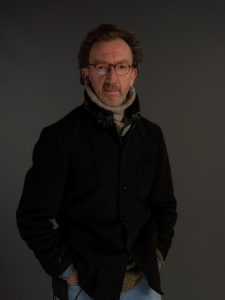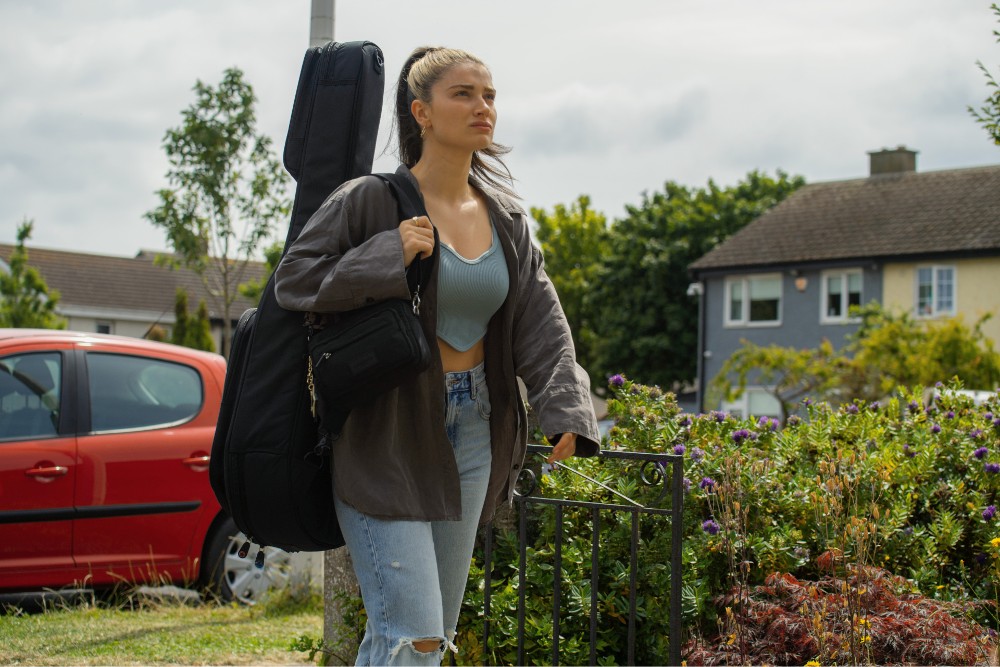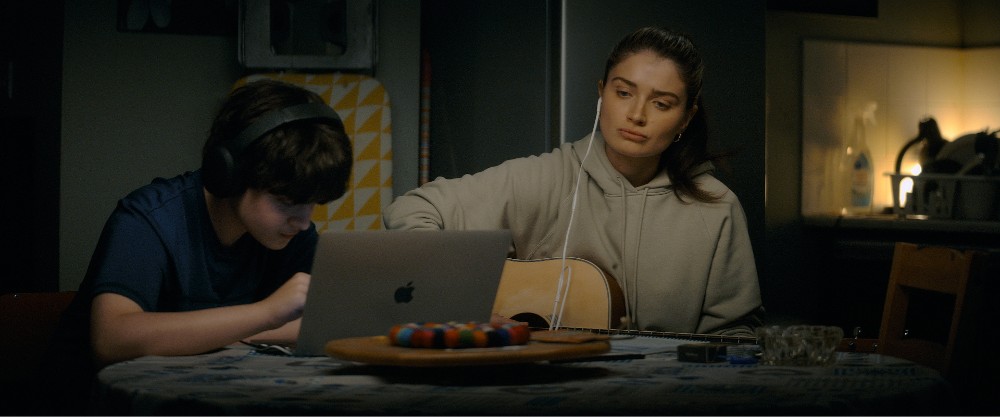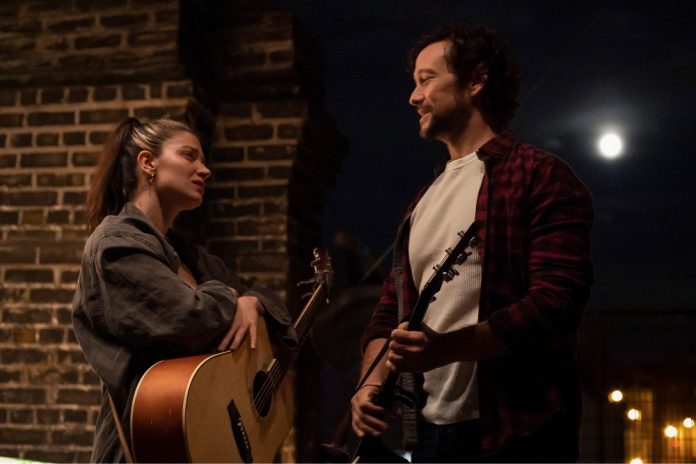After bringing Once and Sing Street to Sundance, director John Carney returned to the wintry film festival this year with his latest musical, Flora and Son, which Apple acquired for $20 million out of the festival. The film has earned rave reviews on the festival circuit, having also screened at the Toronto International Film Festival (TIFF) earlier this month.
Flora and Son stars Eve Hewson as the title character, a single mother in Dublin, Ireland, whose teenage son, Max (Orén Kinlan), is constantly getting into trouble. Unsure what to do with him, Flora finds a beat-up acoustic guitar in a dumpster, hoping he might be interested in learning how to play. Max, however, is more into hip hop, so she decides to learn guitar herself online with the help of Jeff (Joseph Gordon-Levitt), a failed singer-songwriter living halfway around the world in Los Angeles, who finds himself enchanted by Flora’s sassy Irish charm.
Flora and Son definitely shares some of the same DNA as Carney’s previous films, as not only is it his third music-based movie in Dublin, but like 2013’s Begin Again, it also deals with a parent-child relationship. The film finds Carney once again collaborating with Scottish musician and songwriter Gary Clark, who also provided tunes for Sing Street and worked with the director on his Prime Video series Modern Love.
Above the Line spoke with Carney over Zoom shortly after the TIFF premiere of Flora and Son, and the director discussed how it fits within his larger filmography.

Above the Line: I love that your movies have been about writing songs and making music. It’s something you clearly have a knack for, and they’re always enjoyable. For Flora and Son, did you write any of the songs in advance of the script or did those come once you’d finished?
John Carney: I always have something going on my laptop, on GarageBand, above my piano. If I had my laptop here, I’d show you. I have about 50 songs that… you have to understand, I can’t write the perfect song. I just can’t do it. It’s so hard, but I still love doing it. That’s the embarrassing thing. I’m like a dog with a bone. I just keep going. Sometimes, I’ve managed over the years to write a really good verse or half a chorus or a really nice intro, something that suggests something great, but I can’t do it on my own.
For a while, that was frustrating, but then I got into filmmaking and I parked that. I just look back at music now as a hobby, like a therapeutic thing that I did for my own entertainment. That’s when it actually started to pay off, because I enjoyed it, and I never monetized it, and it never became my living. It was always just a lovely thing that I’m glad I have the gift of — not the gift as in the talent, [but] the gift of being allowed to do music as a kid.
In light of that, these are my visual albums. They need the help of the visual, and the movie and the story of them, the narrative. I’m just not good enough [as] a songwriter myself to do that professionally, but I found this nice little niche, this lane of my own, [where] I sometimes throw in ideas for music.
Whenever Gary or Gregg Alexander or Glen [Hansard] [write a song] — any of those guys could write a perfect song — you’d be crazy to mess with it. All of those guys can perfectly write a really beautiful song on their own. Whenever I get a perfect song from somebody, I don’t let anybody else interfere with it. It’s done, and it has the feeling of an authored song. But then, I’ve managed somehow to ingratiate and shoehorn my own experiments at home into my movies in a way that I find very satisfying.
ATL: You mention all these great collaborators you’ve had over the years like Glenn and Gregg and Gary. You always find these great people to work with.
Carney: Absolutely. I don’t know what the connection is. I couldn’t imagine three more different people, but obviously, there’s Markéta [Irglová, the other half of The Swell Season with Hansard], who was involved, and Danielle [Brisebois] on Begin Again, and Eve and Joe both had a couple of songs in this and a part [in] that in terms of the creativity of it, but I’ll go on doing it for as long as I can.
ATL: The vehicle for the music is this story about a young, single mother and her teenage son in Dublin, and there’s a romantic element as well, so tell me about tying those threads together.
Carney: Once I had that story of a woman who pulled a guitar out of a dumpster, that sort of gave me the opening image of a character that fed into what I was thinking about my own relationship with my mother back in the day, when she bought me a guitar and gave me the gift of music, in that sense. I kind of kept building that bridge over to each other, and they kind of met in the middle.
It became the story of Flora, which is a little bit my own story of my mother, or a note of gratitude to her for giving me a guitar when I was 14. It also ties into the pandemic and Zoom and everybody being [on] these screens and not being able to cross-pollinate with people in the same way that I was so used to, because of the pandemic. It was an exploration of that and being caught at home with these screens.

ATL: Eve may be a no-brainer, and Joe has a music background as well, but tell me about casting Orén. Was it tough to find a kid who could lend a rebellious but still sweet-natured presence to the character of Max?
Carney: He was a find. We were a bit stuck a couple of weeks out without that actor, and we were a bit worried that we wouldn’t be able to make the movie without the kid. And then he came along at a late stage. He self-taped with his dad, who’s an actor in Dublin, and he just caught my attention. He stood out, and he had a stillness to him. He sort of played it a bit like a cold killer, which was exciting. He was a bit explosive himself, and the stillness was like he was trying to cover something else up. He looked very plausible. I think he’s a really good actor. I liked the way he looked with Eve — they look convincing and cute together, and you root for them.
ATL: You’ve made movies with musicians with limited or no acting experience, so in general, how do you blend this mix of amateurs and trained professionals, and do you still have room for improvisation or do you have to stick to the script a bit more due to scheduling and budgetary limitations?
Carney: I think we’re pretty tightly scripted. I do allow for a certain improvisation in terms of the day’s work ahead of us on set. That could change, and I can change my mind during the day to entertain myself and not get bored. But this is a film that really needed good actors, first and foremost. The singing and the music weren’t as important in this movie, because they’re not huge musicians. It’s not like A Star is Born or anything like that.
They’re amateurs, let’s be honest. He’s a failed singer-songwriter who is teaching. She’s just learned the guitar recently, and the kid is experimenting, so it didn’t matter really what their musical talents were, even though, obviously, Joe happens to be a good singer and guitar player. It didn’t matter that much, [but] the acting really did matter.
I think what you’re seeing in the movie, what sells it, is really quite good acting and a great central performance, as opposed to something like Once, which was more about plausibility and believability, but it wasn’t [about the] acting per sé. It was kind of observational and distant and peculiar. What I was going for was sort of ultra-realism there.

ATL: I loved how Dublin looks in this movie, and you’ve obviously made several movies there now, so I assume you know the place well and have connections to help secure certain locations. I know this was at Sundance this past January, so I assume it was shot in Ireland last year… was COVID on the downswing already?
Carney: I’m trying to think. There were still a few masks, but no, thankfully, it was on the way out. I think everybody had vaccinations and all of that, so, thank God, we could speak, but I think when we were in closed, small sets, we wore the masks. It’s the worst thing to try and direct anything with a mask on [because you can’t] really connect [with or] smile at your actors [and] let them know that they’ve done a good take. It’s weird. I’d rather not make movies at all than make them under a mask.
ATL: Do you generally have places in Dublin in mind so you don’t have to do a massive location scout for a movie like this?
Carney: Yeah, I do whatever is required of me. I have to cycle around and look at locations. You have to get permits and all of that, but we try and make it look like we just [showed up and] shot there.
ATL: It looked great, and your DP did a fantastic job. I’m not sure how involved you were in getting Sing Street up and going on Broadway… sadly, I never got to see it, though I did get to see Once before it even went to Broadway. If I remember correctly, Sing Street was supposed to open just as COVID shut everything down.
Carney: I know, [what happened] was a horrible story.
ATL: Do you think you’ll ever be able to get it back up and running again?
Carney: I hope so. It’s a very catchy idea. It doesn’t depend on anything, because it’s a period movie. It doesn’t need to happen in the next two months or three months. So it might. I hope so. I invested money [in] it, so…

ATL: I love the songs from Sing Street, and it holds a special place in my heart because of who I saw the movie with at Sundance.
Carney: Hopefully, it does. I think we might try and do [the stage show] in Dublin or London or something first and see if it spreads.
ATL: I know you’ve been working in television for a while and were recently the showrunner on Modern Love. What did you learn from that experience that you brought to Flora and Son, and is serial storytelling on television something you might want to do more of in the future?
Carney: Yeah, television pays for the house, and films pay for some furniture. That’s the way I look at it. One pays the rent, and the other, I never really need to get paid that much on a film. I want to make films, and I like the challenge of the format of films, you need to finish in the same hour and a half that you’ve started. There’s a great circus-like orchestral climax to that, a need for your C to follow B to follow A. There’s a sequential thing that’s very satisfying, and then you’re out. You’ve gotta go and there’s no more. That’s very appealing.
ATL: Do you feel like Flora continues some sort of thematic trilogy for you with Once and Sing Street, or do you feel they should be seen and thought of completely separately? It’s hard to watch Flora and Son and not think of some of your other films, especially Begin Again, seeing as that was also about a parent-child relationship. Do you see those movies as a trilogy or perhaps a tetralogy?
Carney: I think you can probably look at them on their own, but it’s more [like] if you go to see a painter, and he’s working in the studio, and there’s a wall of very similar paintings that the artist is working on. You don’t have to buy them all. It’s sort of a sequential thing, and she’ll say, ‘I did that, and I followed it with this.’ But you’re gonna buy one painting and bring it home, and that’s gonna hopefully stand up on your wall on its own, and you’ll love it on its own. I think you can do either. Hopefully, the films stand up [on their own]. You don’t need to have watched them in any [order], but there’s probably an unconscious strand in them, sure.
Flora and Son is now playing in select theaters and it will begin streaming on Apple TV+ on Sept. 29. Click here to read my review of the movie over at Below the Line.



